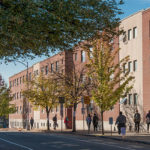Russell Sage College residence halls provide a wide variety of options from historic brownstones to traditional-style residence halls. Most rooms are doubles, although singles and triples are available on a limited basis.
Did you know?
Internet access is provided in all residence hall rooms. (Students bring their own computers, televisions, phones and applicable accessories.)
Each room is furnished with beds, dressers, closets, desks and chairs. Sinks can be found in some rooms. There are common bathrooms on each floor in most residence halls. All residence halls have lounges and laundry facilities. Vending machines and kitchens are available in many buildings.
Resident Assistants (RAs) are the student-staff available to answer your questions, direct you to appropriate offices on campus and plan floor activities. More importantly, your RA is available if you need someone for support and advice.
Kellas Hall (Troy Campus)

The current Kellas Hall was built in 1957 by the college. Named for the first president of Russell Sage College, Eliza Kellas, it is the home for first-year students on campus. The original Kellas Hall was located where the present Kay’s Garden is. The first floor houses the Wellness Center; residents live on the first, second and third floors.
While the building is primarily comprised of double rooms, first-year students who choose to live in Troy during their first year have the option of selecting a single room for an additional cost (pending availability).
Albany Campus Residence Hall

The Albany Campus Residence Hall (ACRH) is located at the heart of the Albany campus and is home for the first-year students on campus. Students electing to live in ACRH are housed in double rooms that encourage community building and interpersonal connections. A large central lounge, located on the second floor, allows for dynamic programming and lots of opportunities for students to gather to study or just watch their favorite television show.
In This Section

